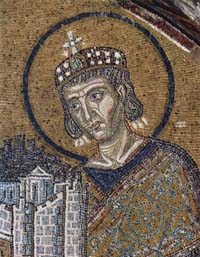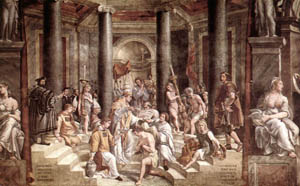Did Emperor Constantine shape the New Testament?
Question: Did Constantine invent, write, redact, edit or otherwise influence the New Testament?
Response: No. Constantine, a fourth century emperor, wasn't born soon enough to have any impact on the writing of the New Testament. The New Testament was written during the first century, the century during which Jesus lived. Constantine lived during the fourth century.
Nonetheless, the claims of this nature have been around for a long time and were popularized by the novel, The Da Vinci Code, which became a bestseller after it was published in 2003, and a movie in 2006.
 Constantine the Great |
The novel essentially claims that Constantine convened a council at Nicea, created the New Testament, and had it canonized. These claims are essential to the plot in The Da Vinci Code because the novel claims that the so-called "Gnostic gospels" were the original Christian documents and Constantine replaced them with the New Testament.
The historical facts, however, show that the New Testament was written during the first century and that the Gnostic gospels were written centuries later, by non-Christians who were trying to imitate Christianity because of its popularity.
Based on writings from early church leaders, including documents dated from the year 96 through the year 112, at least 24 of the 27 books that comprise the New Testament were already regarded by early Christians as being authoritative, a full 200 years before Constantine convened the Council of Nicea.
 The Baptism of Constantine the Great, by Raphael |
And, the Council of Nicea didn't canonize anything. The canonization process actually occurred a full 70 years later, on a different continent (Africa). And it should be understood that the process of canonization wasn't intended to "create" or "construct" a New Testament, but to reaffirm the books that for centuries had already been acknowledged as authoritative by Christians.
In addition, there were several writings by early church leaders, who lived long before Constantine was born, that quote, paraphrase and expound upon all or virtually all of the passages found in the New Testament. In fact, some scholars say that one could reconstruct the New Testament from these early writings by church leaders. Here are a few examples:
" . . . as I possessed all the existing works of the Fathers of the second and third centuries, I commenced to search, and up to this time I have found the entire New Testament, except eleven verses." - "Our Bible: How We Got It," Charles Leach, Chicago, Moody Press, 1898, pages 35-36.
"Indeed, so extensive are these citations that if all other sources for our knowledge of the text of the New Testament were destroyed, they would be sufficient alone for the reconstruction of practically the entire New Testament." - "The Text of the New Testament," Bruce Metzger, New York and Oxford, Oxford University Press, 1969, page 86.
The fundamental beliefs of Christianity, including its message that Jesus was fully man and fully God, that he is the Son of God, that he is divine, etc., are part of the historical record that pre-dates the time of Constantine, by a few centuries.
Also, the novel is incorrect in claiming that Constantine made Christianity the official religion of his empire. He didn't. Instead, he made it illegal for pagans within his realm to continue persecuting Christians.
Next: Did Luke make a mistake involving Theudas and Judas the Galilean?